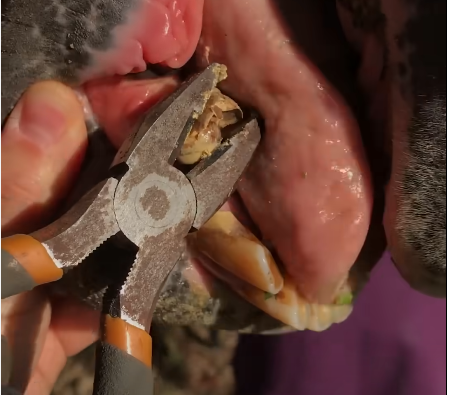Maintaining the dental health of horses is a crucial aspect of their overall well-being. Just like humans, horses can accumulate plaque on their teeth, which, if left untreated, can lead to serious dental issues, discomfort, and even systemic health problems. This article provides an overview of why plaque removal is important, the methods used, and tips for ensuring your horse’s teeth remain healthy.
Understanding Equine Dental Health
Horses have a unique dental structure that allows them to graze and chew fibrous plant material effectively. However, their teeth are not immune to issues like plaque buildup, tartar formation, and periodontal disease. Plaque is a sticky film of bacteria that forms on the surface of teeth, and if not removed, it can harden into tartar. This accumulation can lead to inflammation, pain, and infection, affecting the horse’s ability to eat and enjoy life.
Why Remove Plaque?
- Preventing Dental Disease: Regular plaque removal helps prevent conditions like gingivitis and periodontal disease, which can cause pain and tooth loss.
- Ensuring Nutritional Health: Healthy teeth are essential for effective chewing, which aids in digestion and nutrient absorption. If a horse is in pain due to dental issues, they may avoid eating, leading to nutritional deficiencies.
- Avoiding Behavioral Issues: Dental pain can manifest as behavioral problems, such as difficulty accepting the bit, head tossing, or reluctance to perform. Maintaining dental health can prevent these issues.
Signs of Plaque Buildup
Horse owners should be vigilant about their horse’s dental health. Signs of plaque buildup include:
- Bad breath (halitosis)
- Difficulty chewing or dropping feed
- Swelling around the gums
- Discomfort while being bridled
- Excessive salivation
If you notice any of these signs, it’s essential to address the issue promptly.
Methods for Removing Plaque
- Regular Dental Check-ups: The best way to maintain your horse’s dental health is through regular veterinary or equine dental professional check-ups. A qualified equine dentist can perform thorough examinations and cleanings, removing plaque and tartar effectively.
- Floating: This is a common dental procedure where a dentist uses a rasp to smooth out sharp edges and remove plaque from the teeth. Floating is usually done once a year but may be needed more frequently for some horses.
- Ultrasonic Scaling: Some veterinary practices offer ultrasonic cleaning, which uses sound waves to break down plaque and tartar. This method can be more effective than manual floating, especially for severe cases.
- Daily Care: Owners can help maintain dental health by incorporating daily care practices. Using specialized dental tools, such as equine toothbrushes and dental pastes designed for horses, can help remove plaque. While it may be challenging to brush a horse’s teeth regularly, establishing a routine can make a difference.
- Dietary Considerations: A diet high in fibrous materials can naturally help wear down plaque. Providing hay, chew toys, and specialized dental treats can encourage chewing and promote dental health. Avoiding excessive sugary treats is also crucial, as sugar can contribute to plaque buildup.
Conclusion
Removing plaque from a horse’s teeth is essential for their overall health and well-being. Regular dental care, including professional check-ups and at-home maintenance, can prevent dental issues and ensure your horse remains comfortable and healthy. By being proactive about your horse’s dental health, you can help them enjoy a long, happy life filled with good nutrition and minimal discomfort. Always consult with a veterinarian or equine dental professional for the best practices tailored to your horse’s specific needs.
